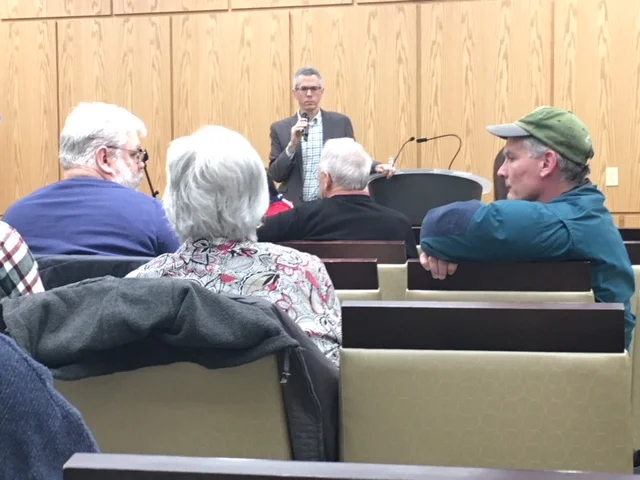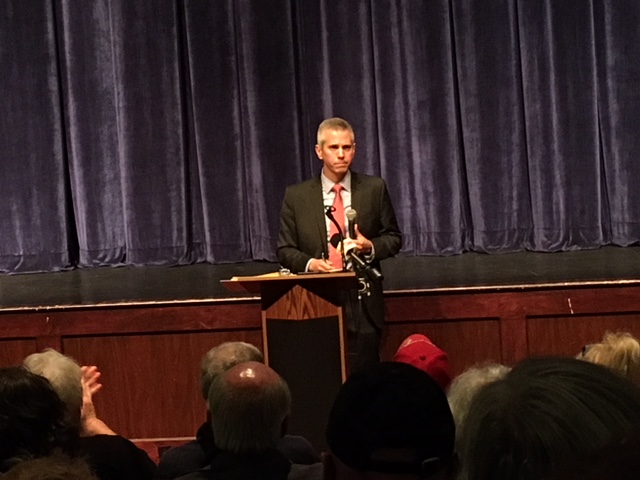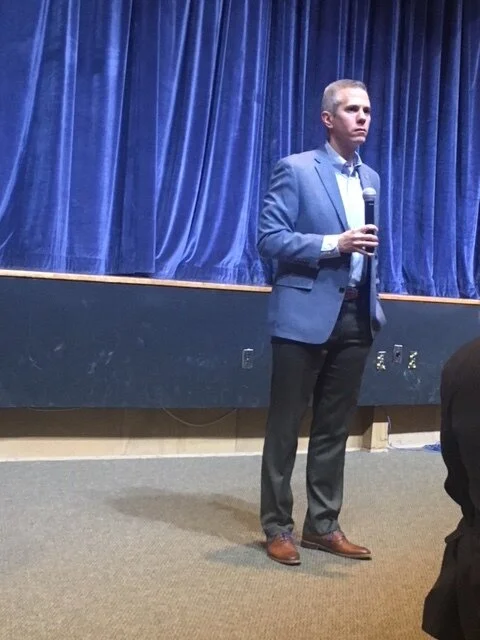NY-22 Minute: All 28 Questions & Responses From Brindisi's Town Hall in Rome By Luke Perry
Rep. Brindisi took the floor at Mohawk Valley Community College at 6:10pm, following a formal introduction. He introduced staff members and began with a brief overview of the district and his work in Washington. Brindisi highlighted being part of a particularly large freshman class and his devotion to governing in a bipartisan fashion that benefits local communities throughout the district. Brindisi emphasized agriculture and veterans affairs, his committee assignments, and his focus on being accessible, individually, through his staff, and during his monthly town halls.
“I’ll take a broom closet. I’m just happy to be here.”
1. What can you do to get Amazon to come here?
Brindisi said Amazon’s decision to not open a new complex in New York is an example of what happens when you let “extremes dictate the conversation.” The state was anticipating $27 billion in revenue from Amazon. This loss hurts upstate and downstate. A “very vocal group of people” used their power and influence to halt this process, which was “unfortunate.” Brindisi cited his efforts with Rep. Katko (NY-24, R) to invite Amazon to come to the area, though he was skeptical this was going to happen because the company appears to have instead opted to expand current locations.
2. Have you no respect for humanity and human life? If so, can you explain your Assembly record regarding abortion?
Brindisi said abortion is a personal issue and cited his Catholic faith. Abortions should be “rare,” “legal” and everything should be done “to prevent unwanted pregnancies.” Brindisi only supports abortion late in terms if this protects the health or life of the mother.
3. What is your position on HR-8?
This bill would require anyone selling a firearm to have a licensed firearms dealer conduct a background check on the purchaser.
Brindisi said New York State has universal background checks, but others do not, which this bill is meant to “fix.” He supports the bill, as it stands now without amendments, and expanded background checks, in general. This will help address guns being bought in other states and smuggled into New York.
4. What is your position on HR-1?
This bill seeks to lower barriers to voting and strengthen lobbying regulations.
“As the bible says,” Brindisi stated, “the root of all evil is the love of money.” HR-1 would “create more transparency” and “disclosure” regarding money and politics. Brindisi ran on this issue, and supports the bill as it stands, though wants to see what amendments are offered. Brindisi lamented that the Senate is unlikely to take up the bill because Leader McConnell said it was “dead on arrival.”
5. Someone expressed concern about the management of DDSO housing in Rome.
Brindisi listened and connected this constituent with relevant staff.
6. Two people inquired about HR-1044 and requested Brindisi be a co-sponsor.
This bill seeks to lower restrictions for employee based green cards, particularly immigrants with highly specialized job skills.
Brindisi spoke of local struggles to find immigrants with specialized skills to meet labor needs and connected the individuals with relevant staff.
7. How would you enhance America’s cybersecurity capabilities?
Brindisi said “this is a very scary time we’re living in,” where countries such as Russia, can interfere with our elections. Brindisi said “cutting edge” facilities, such as Rome labs, should be utilized to address this urgent priority.
8. Is there any consensus on infrastructure legislation in Washington?
“I hope so,” Brindisi said. He was critical of President Trump’s infrastructure proposal because it relied too heavily on privatization and private investment, when national and state partnerships are necessary. Brindisi discussed local difficulties stemming from lack of broadband to Spectrum Cable. Brindisi is “angry” because the Federal Communications Commission keeps giving Spectrum extensions to live up to their promises when they came to the region. Brindisi wrote a letter to the commissioner inviting him to the district, which Brindisi described as a “pipe dream,” and stated the commissioner is “not my favorite person.”
9. What steps are being taken to stop HR-785?
The individual who asked this question appeared to be referencing a union related bill from the 115th Congress .
Brindisi opposes the bill because he believes that federal contracts should go to union workers. Local workers should be hired for local jobs.
Photo by Luke Perry
10. How are you handling education?
Brindisi said he is a “big supporter of public education,” which is a “passion” for him. He cited his wife’s work as a public educator and his children being public school students. Brindisi spoke against trends toward privatization and the relaxation of restrictions against costly loans for students. Brindisi wants the Secretary of Education, whom he was critical of, to testify before Congress on these issues.
11. How can technical skills be enhanced in education?
Brindisi said “we should open every door possible” for people who want to go into these fields. He pointed to the value of two year programs at Mohawk Valley Community College and called for expanding funding of technical programs and Pell Grants.
12. Someone expressed concern about the federal debt. Do you have the ability to say “no?”
“Yes,” Brindisi replied, “I say no to my children all the time.” Brindisi referenced an article he co-wrote for CNN with the other chairs of the Blue Dog Democrats, which prioritized national defense and fiscal responsibility. Brindisi cited various options, including ending subsidies to industries that do not need them, such as oil and gas.
13. Someone advocated for increased diversity locally and increased representation of racial and ethnic minorities in positions of political power.
Brindisi complimented the “excellent points” made. “What breaks my heart,” Brindisi said, “is that we have a lot of young people of color who are leaving.”
14. Someone expressed concern about the amount of foreign aid being spent by the federal government.
“You’re right,” Brindisi said, and cited his efforts regarding foreign aid to Yemen.
The House recently passed a bill to end U.S. military involvement in a Saudi-led war in Yemen.
15. Someone expressed concern about toxic chemicals in the air and water, particularly in relation to public health.
Brindisi said “there has to be greater oversight by the EPA” and referenced the work of former Representative Sherry Boehlert under a Republican president. The current EPA is rolling back many of these protections. Brindisi said what is needed is a “healthy balance” of listening to environmental groups, industry, and people because “industry’s cannot be left to police themselves.”
Photo by Luke Perry
16. Someone spoke in support of family leave being adopted at the federal level.
Brindisi said there is talk of a family leave bill working its way through the House and Senate. Brindisi cited this as a top issue at his town hall with AARP, particularly in regards to caretaking, and something that has bipartisan support, from people such as Ivanka Trump.
17. Should President Trump cut Medicaid without Congressional approval? What can be done to address the rising cost of prescription drugs?
“No,” Brindisi replied. He is “very concerned about executive overreach” and said it is very clear that Congress controls the purse strings in the U.S. Constitution.
Brindisi anticipates a prescription drug bill emerging in House and hopes the Senate will take it up. He called for allowing Medicare to negotiate drug prices, making generics easier to get to market, and importing drugs from outside the United States.
18. How would you fix Social Security?
Social Security is a “big issue I’m concerned about,” Brindisi said, and “it’s an earned benefit that people paid for, not an entitlement.” He called for wealthier individuals, who primarily derive their income from capital gains and other investments, to pay more.
19. How will you address the opioid epidemic and what is your reaction to plant based treatments?
Brindisi said this “sounds like something we should be looking at” and referenced his co-sponsorship of a bill (HR-712) for research on Cannabis treatments for post-traumatic stress disorder experienced by veterans.
20. What have you done to help protect LBGT people from discrimination?
Brindisi said “no one should be discriminated against” on the basis of their skin color, or who they love, or for having a disability. He will be an original sponsor on the Equality Act (which “would amend longstanding civil rights laws to extend legal protections based on sexual orientation and gender identity”) when it gets proposed.
21. Someone discussed access to healthcare for his/her child who has a rare health condition.
Brindisi referenced his recent work on increasing access to healthcare and expressed concern about limited transportation to healthcare facilities, particularly for people who live in rural communities. He supports this being part of new infrastructure bill. Brindisi also discussed the challenges of attracting specialized doctors to low population areas and called for strengthening the American with Disabilities Act in a “new 2.0 version.”
22. Someone discussed concern about the president recently declaring a national emergency at the Southern border to construct additional walling.
Brindisi said national emergencies are typically declared for war or health epidemics. He was unsure if a House bill rejecting the emergency will pass the Senate, but if it does, the president will veto it, and it is unclear Congress would have a two-thirds majority to override the veto. Either way, Brindisi believes the issue is likely to get tied up in the courts.
Brindisi expressed concern that the money President Trump is requesting will come from military base housing, placing money allocated to fencing at Rome’s Griffiss Air Force Base under threat. He also did not believe this was a good precedent to set and called for checks and balances.
23. Someone expressed concern about global warming and asked for his approach to this.
Brindisi said “you will be happy to know that actual climate scientists will be testifying in the House again.” He believed this was a crisis that needs to be addressed. Updating infrastructure was one way to help encourage clean energy. The “green New Deal is very popular,” said Brindisi, who likes “big, bold ideas,” but he is concerned that nuclear and hydroelectric power in the district are not considered clean energy. under this resolution. Brindisi called for being “respectful” of these industries and the union jobs these industries supply.
24. Someone expressed concern about losing friends to opioids and mental health illnesses.
Brindisi called for increased investment in programs addressing these challenges. “I don’t have the answers,” Brindisi explained, but expressed willingness to sit with relevant experts and discuss solutions.
25. Someone expressed concern about him not sufficiently standing up for equality, particularly for people of color and women.
Brindisi cited the Equality Act and Paycheck Fairness Act as bills he is co-sponsoring that address these concerns. He praised the diversity of his incoming freshman class and spoke of devoting time to building relationships with as many as different legislators as possible.
26. Someone expressed concern about the length of bills being written in Congress.
Brindisi was excited about new rules adopted this Congress requiring more time for members to review the content of bills before voting and requiring votes on bills that obtain a certain threshold of sponsors.
27. Where do you stand on legalizing recreational marijuana? Can you stop robocalls and related scams?
Brindisi thinks this should be up to the states and does not support the federal government “cracking down” on this.
Brindisi said scammers have gotten wise to do-not-call-lists by putting the mechanisms generating calls overseas, beyond regulation, though incoming calls look like local numbers. Brindisi said this is more of a law enforcement issue than a legislative one.
28. Someone encouraged people to speak up for their beliefs.
Brindisi welcomed feedback and encouraged people to get involved in their communities.
Brindisi took public questions until 8:00pm and then visited individually with several audience members and journalists.
Luke Perry (@PolSciLukePerry) is Chair and Professor of Government at Utica College
Read the NY-22 Minute for timely and comprehensive analysis NY-22 politics.








